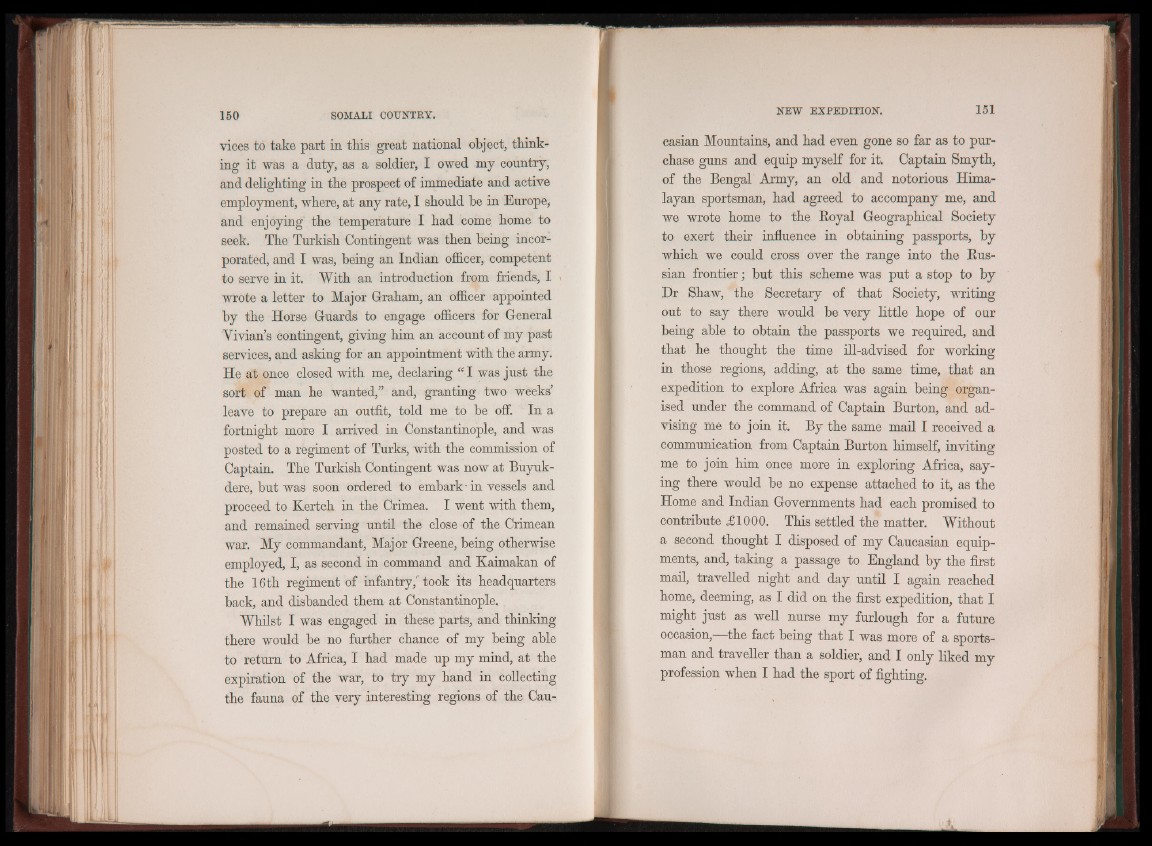
vices to take part in this great national object, thinking
it was a duty, as a soldier, I owed my country,
and delighting in the prospect of immediate and active
employment, where, at any rate, I should be in Europe,
and enjoying the temperature I had come home to
seek. The Turkish Contingent was then being incorporated,
and I was, being an Indian officer, competent
to serve in it. "With an introduction from friends, I
wrote a letter to Major Graham, an officer appointed
by the Horse Guards to engage officers for General
Vivian’s contingent, giving him an account of my past
services, and asking for an appointment with the army.
He at once closed with me, declaring “ I was just the
sort of man he wanted,” and, granting two weeks’
leave to prepare an outfit, told me to be off. In a
fortnight more I arrived in Constantinople, and was
posted to a regiment of Turks, with the commission of
Captain. The Turkish Contingent was now at Buyuk-
dere, but was soon ordered to embark-in vessels and
proceed to Kertch in the Crimea. I went with them,
and remained serving until the close of the Crimean
war. My commandant, Major Greene, being otherwise
employed, I, as second in command and Kaimakan of
the 16th regiment of infantry,1' took its headquarters
back, and disbanded them at Constantinople.
Whilst I was engaged in these parts, and thinking
there would be no further chance of my being able
to return to Africa, I had made up my mind, at the
expiration of the war, to try my hand in collecting
the fauna of the very interesting regions of the Caucasian
Mountains, and had even gone so far as to purchase
guns and equip myself for it. Captain Smyth,
of the Bengal Army, an old and notorious Himalayan
sportsman, had agreed to accompany me, and
we wrote home to the Boyal Geographical Society
to exert their influence in obtaining passports, by
which we could cross over the range into the Russian
frontier; but this scheme was put a stop to by
Dr Shaw, ’ the Secretary of that Society, writing
out to say there would be very little hope of our
being able to obtain the passports we required, and
that he thought the time ill-advised for working
in those regions, adding, at the same time, that an
expedition to explore Africa was again being organised
under the command of Captain Burton, and advising
me to join it. By the same mail I received a
communication from Captain Burton himself, inviting
me to join him once more in exploring Africa, saying
there would be no expense attached to it, as the
Home and Indian Governments had each promised to
contribute £1000. This settled the matter. Without
a second thought I disposed of my Caucasian equipments,
and, taking a passage to England by the first
mail, travelled night and day until I again reached
home, deeming, as I did on the first expedition, that I
might just as well nurse my furlough for a future
occasion,—the fact being that I was more of a sportsman
and traveller than a soldier, and I only liked my
profession when I had the sport of fighting.